It’s possible to find data on gambling behaviour from all over the world. But in some cases, it’s difficult to know how accurate it is, and for what purpose, it’s been done. 2021, Sweden ranked 4th on the global Corruption Perception Index. The Swedish Gambling Authority is part of the Swedish government institution in which we put the highest trust. Therefore, we choose to translate the report.
Here are a few questions the survey helps answer:
- What type of gambling is most popular?
- How many gambles on slot machines, casinos & poker?
- How often do people gamble?
- Where do people gamble?
- Why do people gamble?
- How many think they gamble too much?
Before we dive into the full survey report. Here are our key takes from the report.
- 53% of respondents have gambled in the past month and 73% in the past year.
- The most popular forms of gambling are: Lotteries/Bingo with 75%, trotting with 21%, sports betting with 14%
- 4% of masculine gamblers and 3% of female gamblers are gambling on slot machines.
- In other casino games 7% of men, and 3% of women.
- The most popular sports for sports betting are Football (90%), Ice hockey (35%), Basketball (5%), and Tennis (3%).
- The vast majority (86%) of gamblers gamble at home.
- The main reasons why people gamble are entertainment, the possibility to win and to win big.
- 2% think they have gambled too much in the past 12 months.
- 5% think that someone around them has gambled too much in the past 12 months.
- Only 1% have used Spelpaus.se
_________________
The following is a translation of the Report to the Swedish Gambling Authority published in November 2021.
SKOP has, on behalf of the Swedish Gaming Authority, interviewed more than 1,600 people who are 18 years or older about their gaming habits. The interviews were conducted in November 2021.
The implementation of the survey is reported in the section ”Method description.” In SKOP’s archives, the survey has reference number S3OKT21.
Oscar Hultåker and Örjan Hultåker are responsible for the investigation of the Swedish Gaming Authority. If you want to read the research methodology, you find it in table 31.
Summary of key data
- About every second interviewee (53 %) has gambled in the past month. One in three (34 %) has gambled in the past week. Three out of four (73 %) have gambled in the past year.
- The proportion who have gambled in the past week has increased gradually since 2019. In 2019, the number was at the lowest level since 2013.
- Of those who played in the past year, every second person (50 %) plays every month, 29 % plays every week, and 2 % play almost every day.
- Among those who have played in the past year, lotteries and number games are the most common form of gambling. Second, we find trotting betting (21 %). Tied in third place are bingo and betting on other sports than trotting with 14 % each.
- The most common (86 %) is that gamblers gamble at home. In second place will be gambling in the betting shop (20 %).
- The probability of winning is one of the three most important factors (41 %) when people gamble. Almost as many (36 %) state the reward/bet size of the bet as one of the three most important factors.
- The fact that the gambling organizer is a gambling company with a Swedish license is appreciated by every third player (33 %) as one of the most important factors when they play.
- A majority (65 %) gambles mainly for pleasure and entertainment. Many gambles for the probability of winning (42 %) as well.
- Of those who have gambled in the last 12 months, 15 % have at least two gambling accounts for online gambling. The dominant reason (92 %) is that different gambling companies offer different types of games.
- Of those who have played in the last 12 months, few (7 %) think that the gambling companies absolutely take responsibility for gambling problems. Another 35 % think that the gambling companies do this to some extent.
- A majority (53 %) think that the word “sund” (English translation “sound”) is a very or relatively poor description of the gambling market. Almost every other person (48 %) thinks that the word “entertaining” describes the gambling market in a very or somewhat good manner.
- Of those who have gambled in the last twelve months, only one in ten (10 %) answer that they know how to recognize if a gambling company or website has a Swedish gambling license or not.
- Most players (52 %) think that there are advantages for them to gambling at a gambling company with a Swedish gaming license.
- One in five players (20 %) can absolutely or perhaps imagine gambling with a gambling website that doesn’t have a Swedish license, 4 % answer that they absolutely can do that.
- A few (1 %) know that they have intentionally gambled on sites without a Swedish gambling license in 2021.
- Few of those who have gambled in the past 12 months have had contact with customer service or other staff at any gambling establishments they gambled in.
- One in three Swedes (36 %) believe that the gaming industry absolutely or perhaps takes sufficient social responsibility; 5 % answer that the industry absolutely does.
- A majority (53 %) have seen or heard gambling advertisements from portals like Aftonbladet.se daily or weekly.
- Two % of Swedes feel that they have gambled too much at some point in the past 12 months. More (5 %) think that someone close to them has gambled too much during the past year. Only a few people (less than 1 %) have sought help because they have gambled too much.
- A majority of Swedes (59 %) know about spelpaus.se, and 1 % have used the site.
How often do people gamble?
53 % have played in the past month
Initially, SKOP informed that “By games, we mean in the following questions games about money, that is, where the chance of winning in different degrees depends on luck. There are games in physical form, e.g., buying scratch cards, playing slot machines, betting on trotting or going to the casino, and online gambling, e.g., sports betting, online casino, and bingo. ”
Then they asked the question: “When did you last gamble?”
Approximately one in two interviewees (53 %) answered that they have gambled in the past month, and one in three (34 %) have gambled in the past week. Three out of four (73 %) have gambled in the past year.
Approximately one in ten (8 %) has never gambled, and 2 % do not know when they lastly gambled.
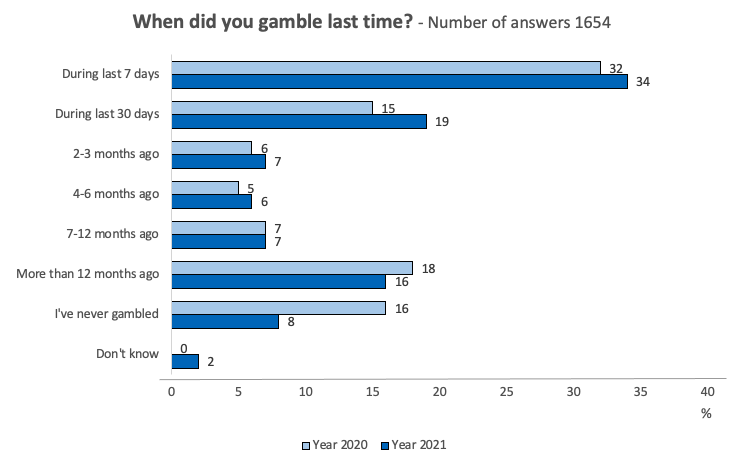
Men have played to a greater extent than women in the past week. Older people have gambled more than younger people. People with short education have gambled more frequently than those with long education.
In the past week, married or cohabiting people have gambled more than single people. The 25 % of the population with the lowest incomes have gambled less than those with higher incomes.
The share who has played in the past week has increased gradually since 2019. In 2019, the proportion was at the lowest level since 2013. The percentage of those who have gambled in the past week is now back at approximately the level that applied in 2017.
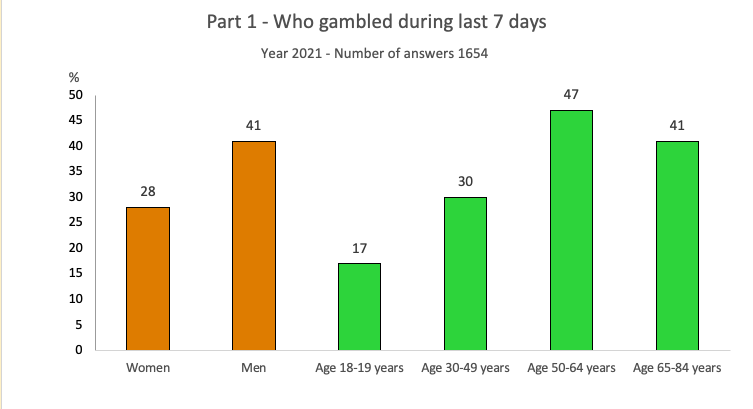
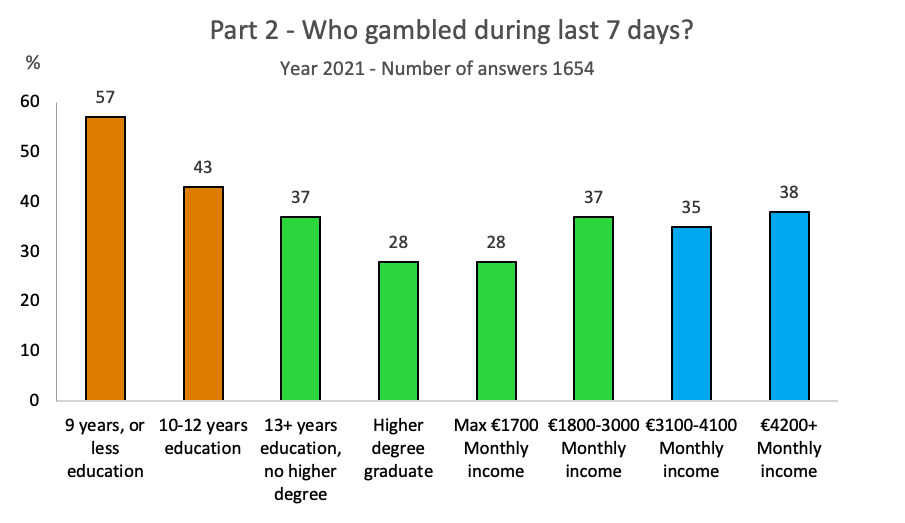
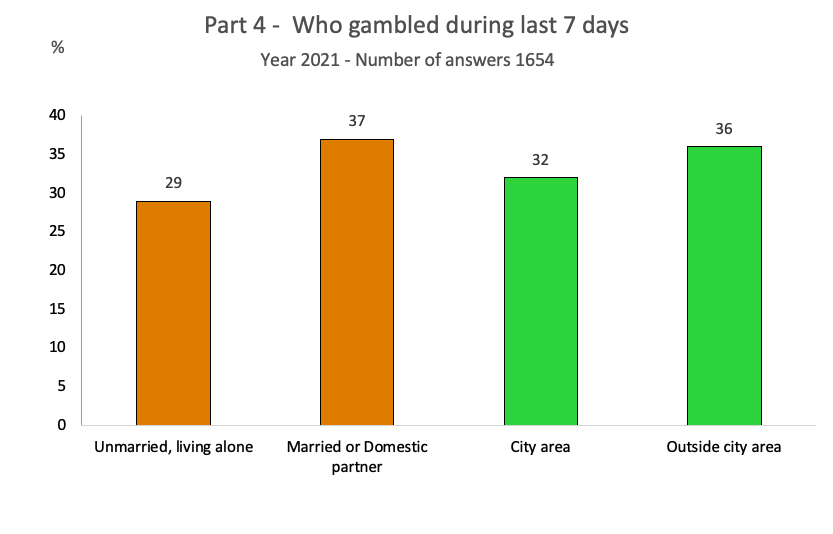
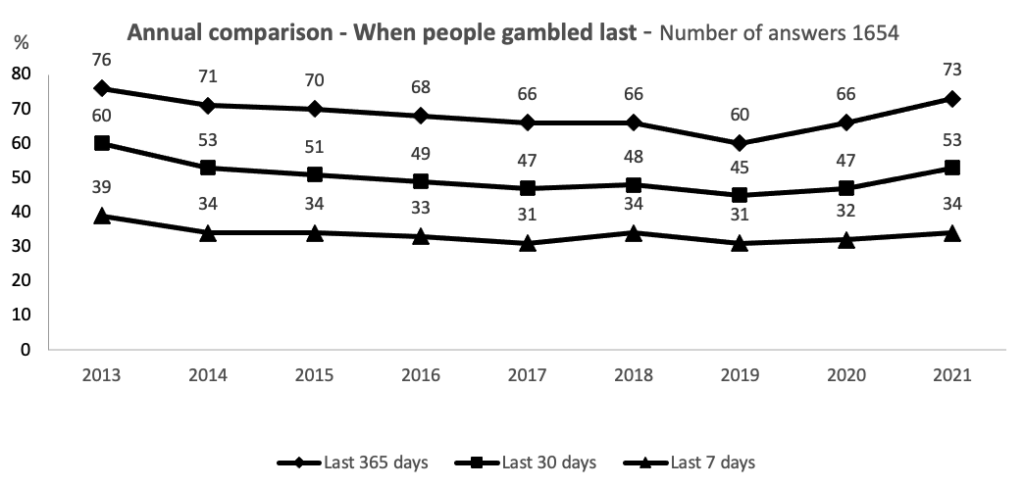
Reason not to play
People who hadn’t gambled for the past 12 months were asked. “Which of the following reasons best describe why you didn’t gamble?” Multiple answers were applicable.
About (29 %) answer that they don’t gamble because they never win or win. Almost as many (24 %) have low confidence in the current gambling market.
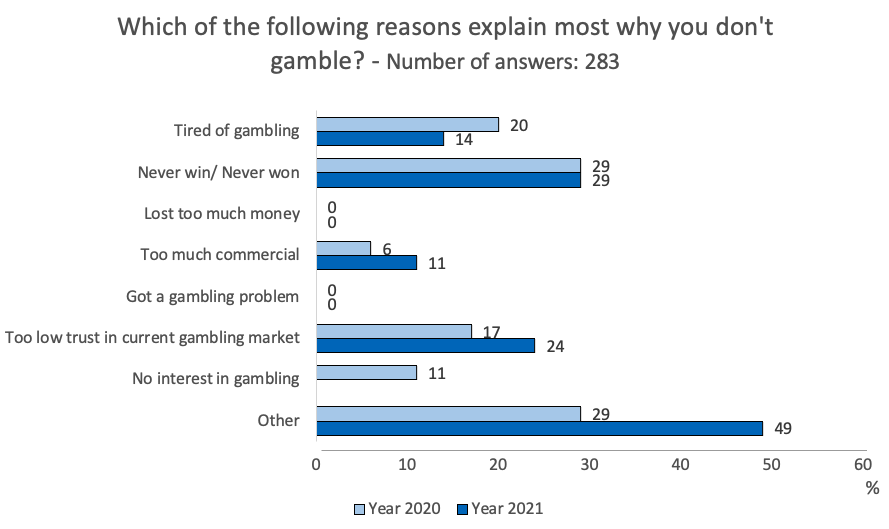
50 % play every month
Those who gambled in the past 12 months were asked, How often do you play? ”
This year, every other person (50 %) gambles every month, 29 % gamble every week, and 2 % gamble almost daily. In 2020, 55 % gambled monthly, and 29 % did it weekly.
Men gambled every month to a greater extent than women. People over 50 gambles more than younger people, and people with a short education gamble more frequently than those with a more comprehensive education.
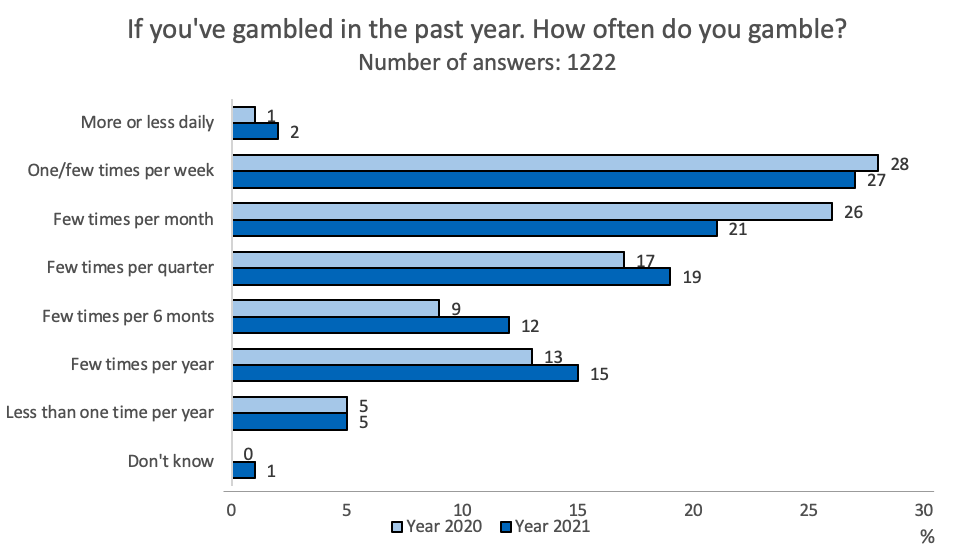
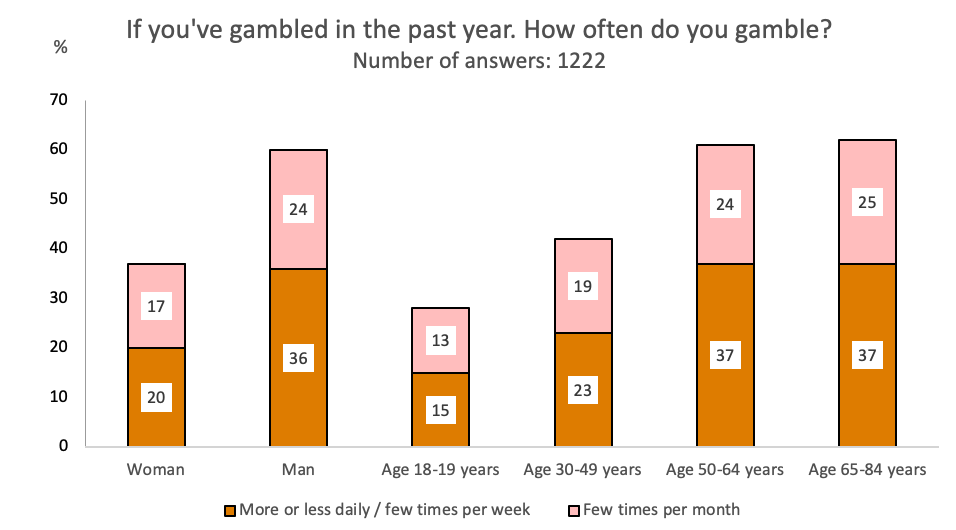
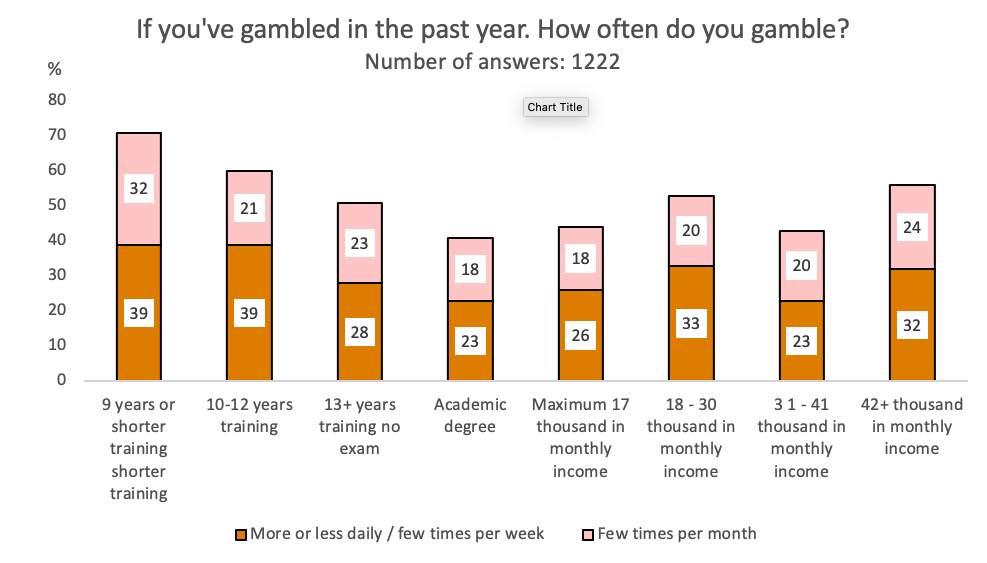
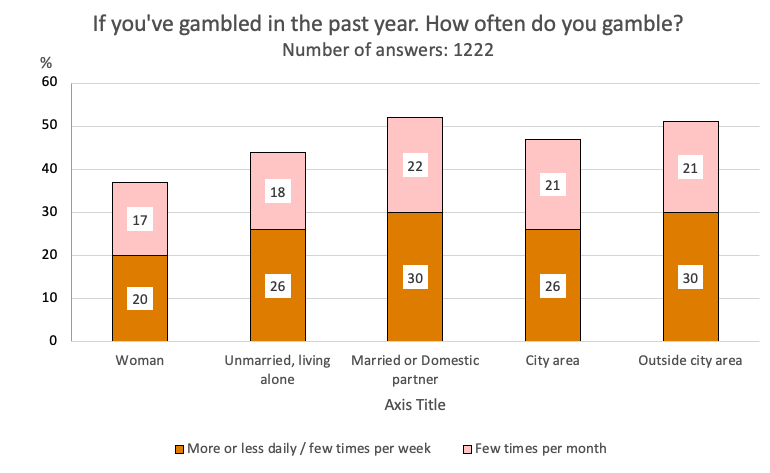
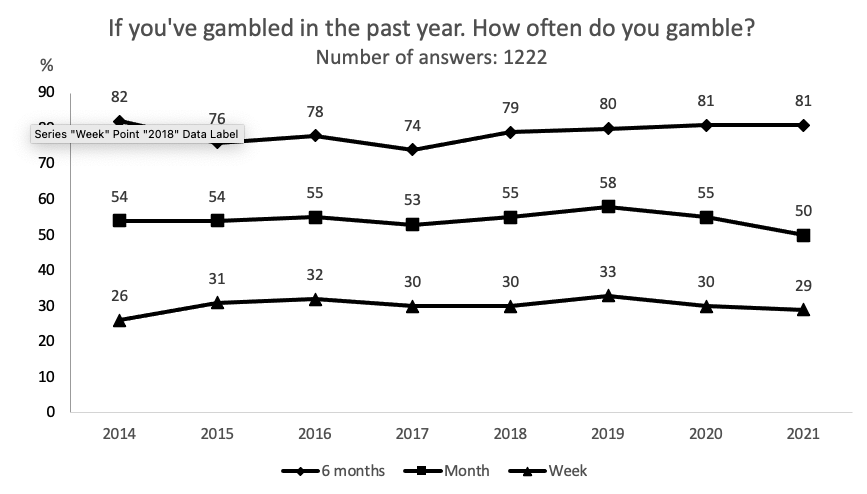
What type of gambling is most popular?
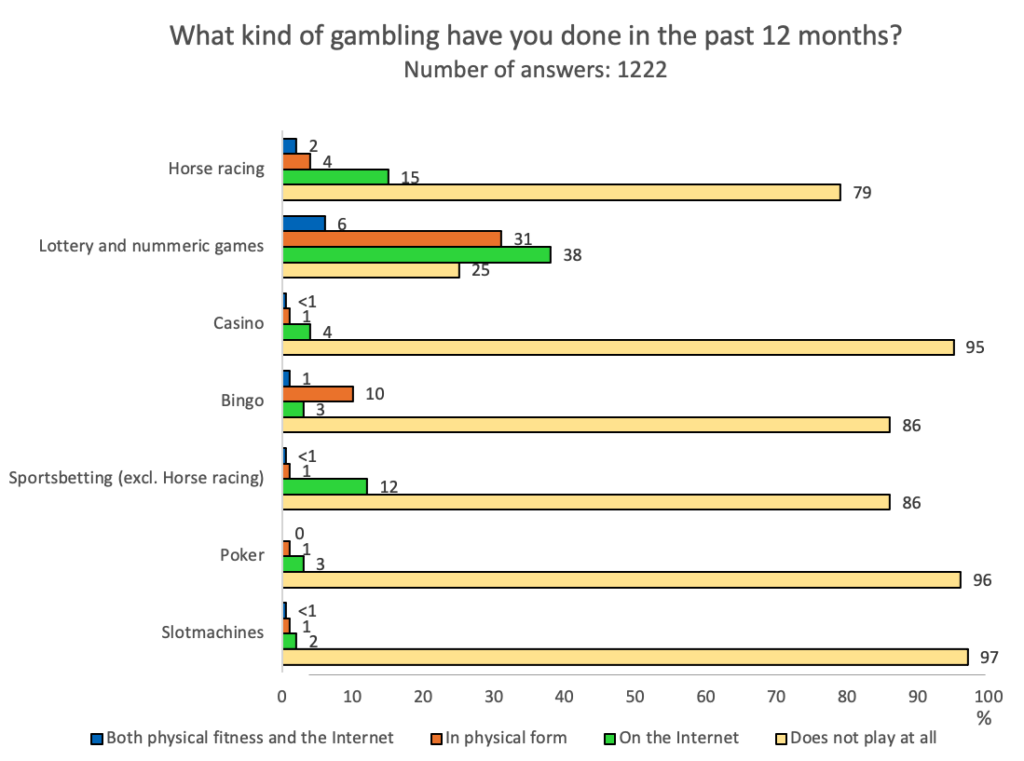
Among those who have gambled in the past year, lotteries and number games are the most common form of gambling.
75 % have gambled in lotteries and number games. Of those, 38 % have gambled online, and 37 % physically in betting shops, via agents, or on horse tracks. Some (6 %) have gambled physically and online.
There is a strong correlation between gambling frequency and gambling online. The more frequent players gamble, the larger the proportion of gambling online for lotteries and number games.
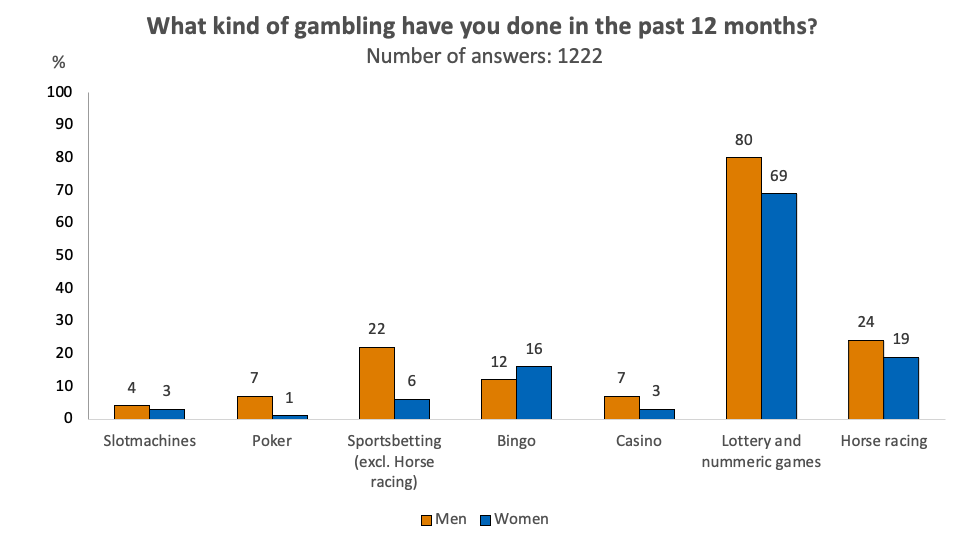
Women and older people have gambled more than men and younger people in physical form in lotteries and number games. Men and people aged 30 to 64 have gambled such games online to a greater extent than others.
People in the lower half of monthly salaries have gambled more physically on these games than people with higher wages. Those with lower incomes have gambled online to a lesser extent than those with higher incomes. Single people have gambled in a physical form more than married/cohabiting.
Trotting is the second most common form of gambling
One in five gambles (21 %) on horse racing is the second most common form of gambling in Sweden. Those who gamble most frequently also bet on trotting to the greatest extent.
Trotting betting is largely done online, and the more often a person gambles, the more common it is that the betting takes place online.
Men gamble on trotting to a greater extent than women, and younger people do it less than older people. Those who have an academic degree bet to a lesser extent than others. Trot betting is more common outside the three metropolitan areas than in Stockholm, Gothenburg, and Malmö.
Bingo and betting on sports except trotting
In shared third place come bingo and betting on sports other than trotting. 14 % of the players gamble on bingo and sports betting (trotting betting not included). Bingo games mainly take place in physical form and sports betting is primarily online.
Bingo is the only form of gambling where women gamble more than men. Men engage in sports betting to a greater extent than women do.
Casino, poker, and slot machines
Compared with the other reported forms of gambling, only 5 % gamble at casinos, 4 % play poker, and 3 % on slot machines. Men gamble more at casinos, poker, and slot machines than women.
Sports betting in physical form besides trotting
Among those who have engaged in physical betting other than trotting, it is most common to bet on football (66 %) and in second place ice hockey (37 %). Since the questionnaire only received 16 answers, be cautious with the numbers.
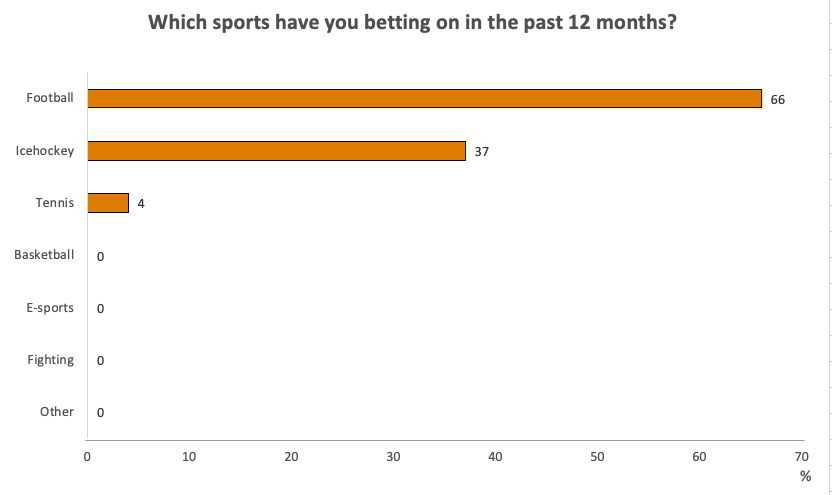
Online sports betting besides trotting
It is most common for sports betting online other than trotting to bet on football (90 %) and ice hockey (35 %).
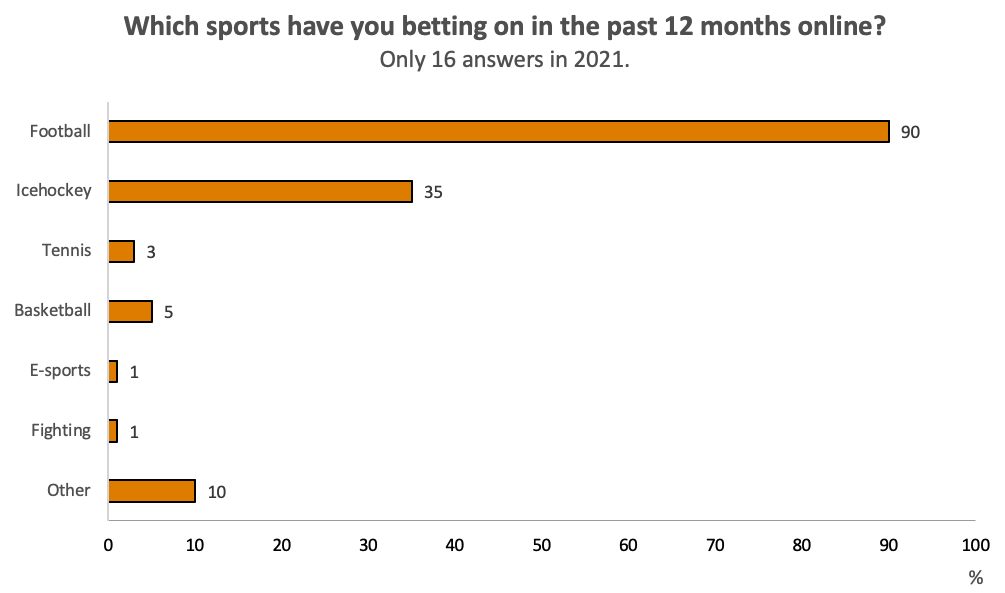
Where do people gamble?
Those who gambled over the past last year were asked, “In what place or places have you gambled in the last 12 months?” They could give multiple answers.
The most common (86 %) said they gamble at home and in second place, betting shops (20 %).
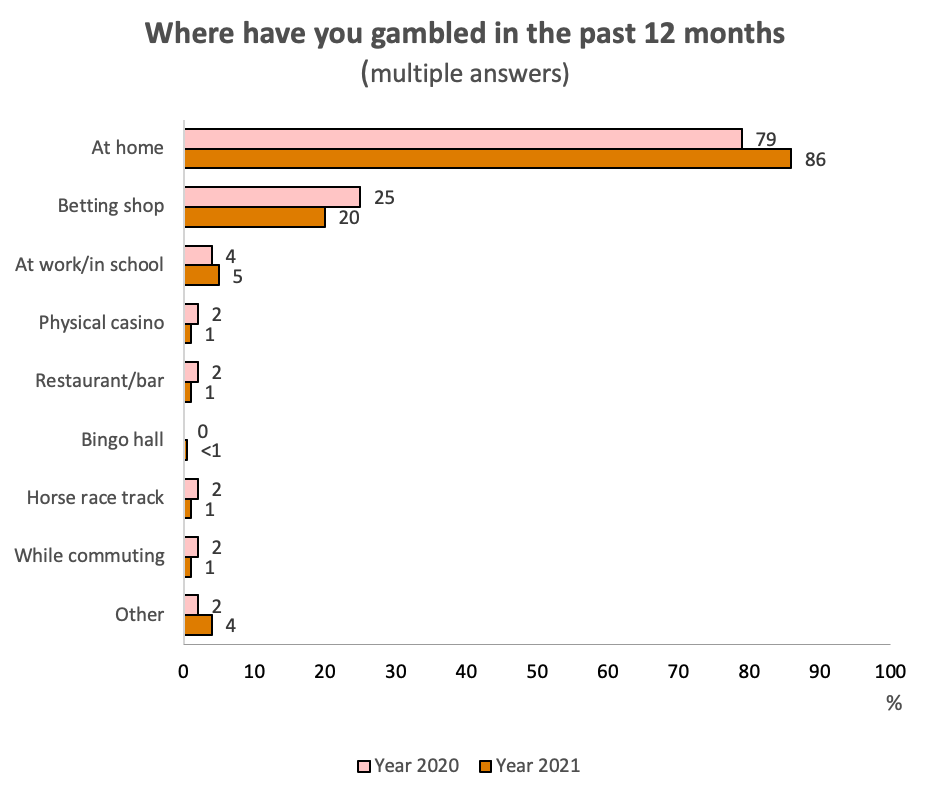
Important factors when playing
Those who have played in the last 12 months were asked, “What is most important to you when you gamble?” The interviewees were allowed to choose three of twelve alternatives.
1st place: The probability of winning
In the first place (41 %), the probability of winning. The answers indicate that the shorter the person’s education is, the more important the factor “probability of winning” is.
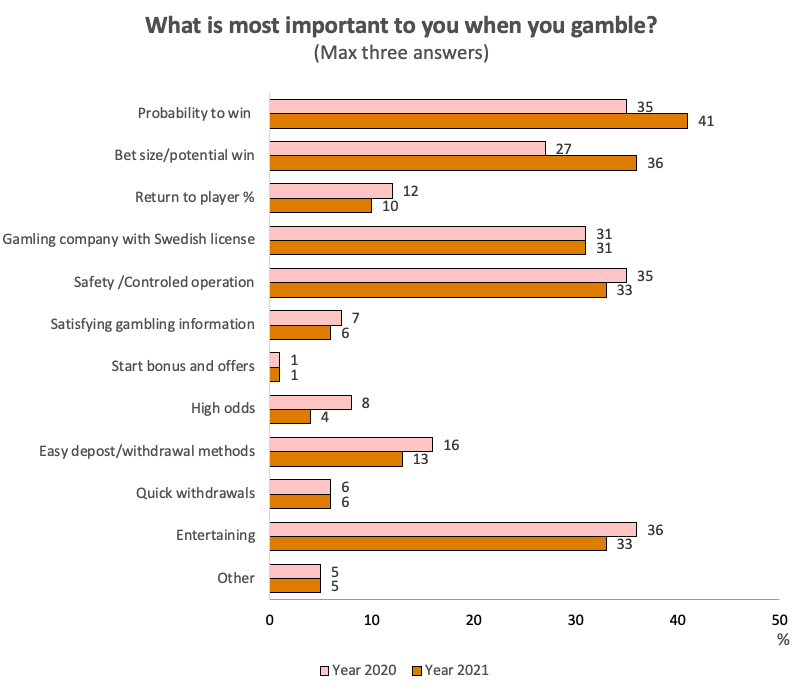
2nd place: The bet/reward ratio
Almost as many (36 %) state the bet/reward ratio as one of the three most important gambling factors.
These are followed by (safely controlled operations (33 %), and that it’s entertaining (33 %).
Every third gambler (33 %) appreciates the fact that a gaming company holds a Swedish gambling license as a key factor when gambling.
The main reason why people gamble?
Those who have played in the last 12 months were asked: “What or what are the main reasons why you gamble?” The interviewees were allowed to choose three of eight response options.
Most important: fun and entertainment
Why do people gamble – A majority (65 %) mainly gamble for pleasure and entertainment. In second place (42 %) the respondents answered the probability of winning. About (27 %) answered they gamble to win big, followed by for a good cause (12 %) and to win money for daily use (12 %).
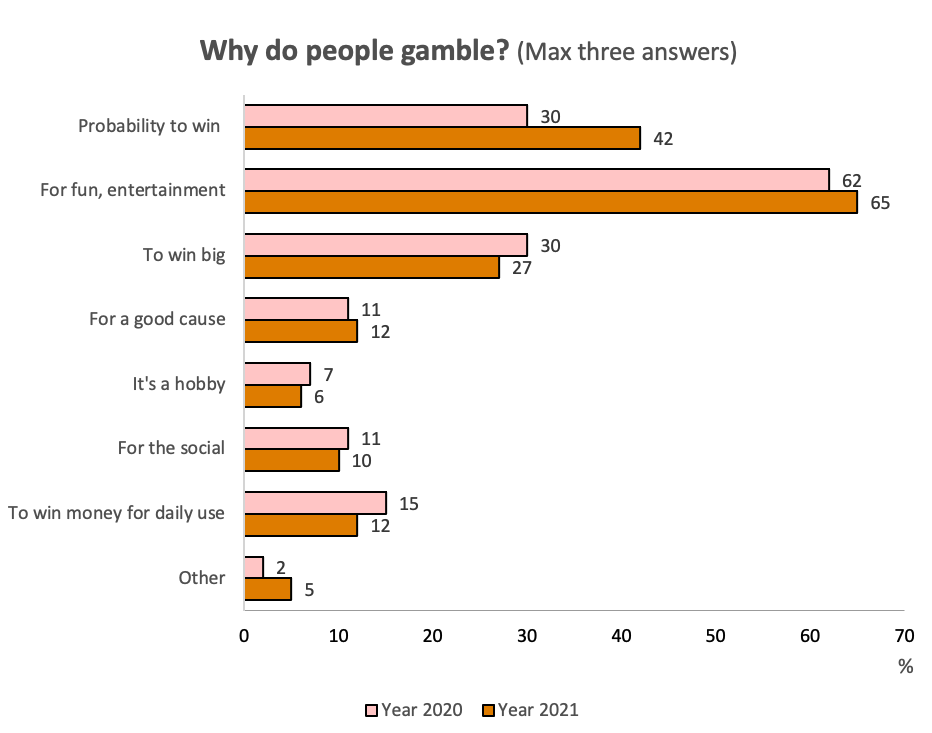
Number of online operator accounts
15 % have at least two accounts with different operators
Of those gambling in the last 12 months, 15 % have at least two gambling accounts with various online operators. Half of the interviewees (46 %) don’t have an account at all
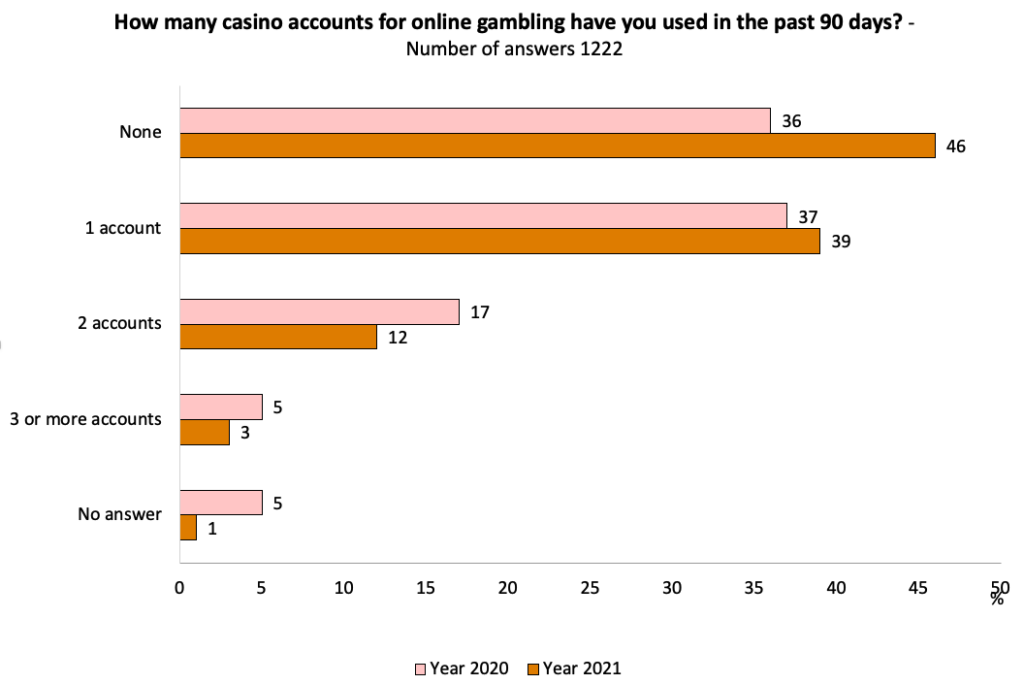
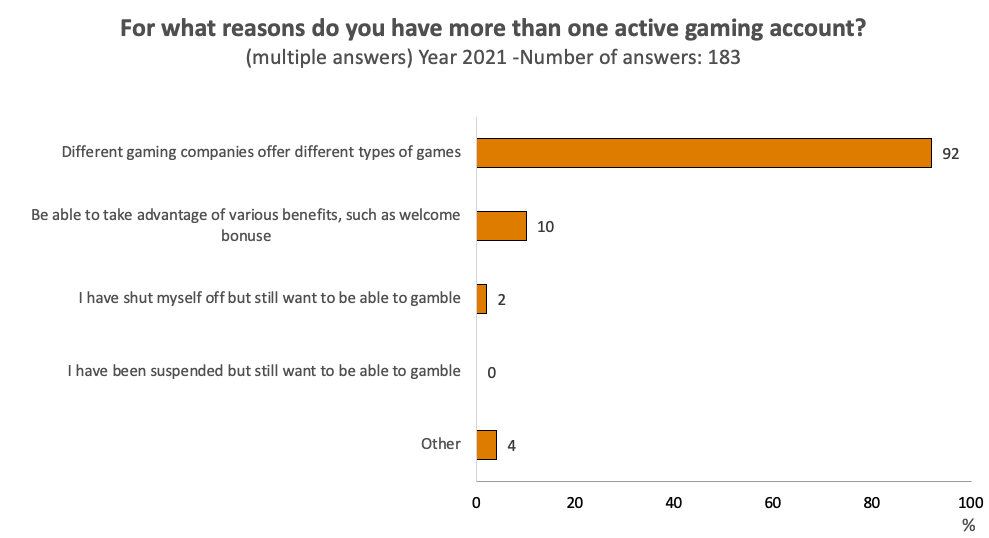
Why do players have multiple gambling accounts?
Those who have at least two active gaming accounts were asked why: The dominant reason (92 %) is that different gambling companies offer different types of games. Some also answer that they want to take advantage of various benefits, e.g., welcome bonuses.
Popular gambling sites
Svenska Spel dominates
Those who have played on the Internet in the last 12 months were asked, “When you gamble online, which gambling site do you mainly use?”
As in previous studies, online gambling is dominated by Svenska Spel. In second place is ATG.
Perception of the gaming market
Gambling companies’ responsibility for gambling problems
Of those who have gambled in the last 12 months, few (7 %) think that the gambling companies absolutely take responsibility for gambling problems. Another 35 % think that the gambling companies take responsibility to some extent.
Many (27 %) think that gambling companies don’t take any responsibility for gambling problems at all.
Most critical of the gambling companies’ responsibility are those who play as infrequently as once a year. The least critical are those who play every week.
In the 2020 survey, the question was phrased differently.
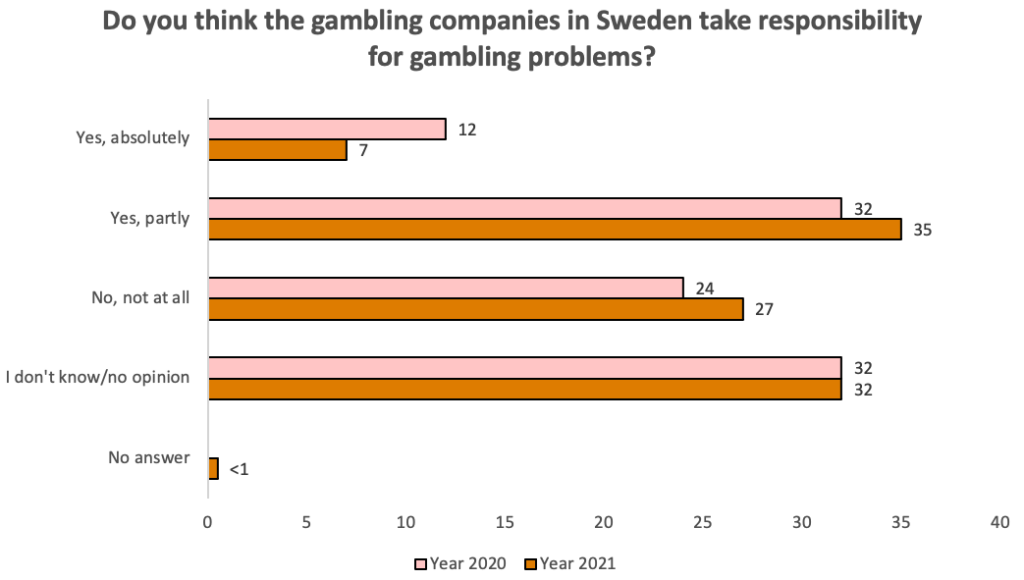
Players’ description of the gambling market
Those who have played the last 12 months had to choose four words to describe the market.
53 % think “sound” poorly describe the gambling market
A majority (53 %) believe that the word “sound” is a very poor or rather bad description of the gambling market. 27 % answer very poorly. Only 9 % believe that the gambling market is very or fairly sound.
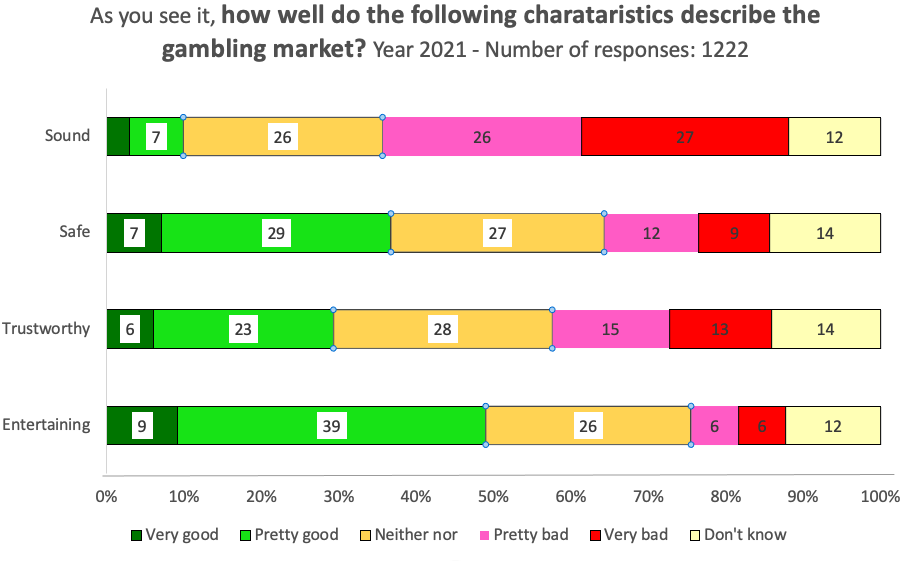
36 % think “safe” describes the gambling market in a good way
One in three (36 %) think that the word “safe” describes the gambling market in a very, or fairly, good way. 7 % answer very well. One in five (21 %) think that the word “safe” describes the gambling market in a very, or rather, bad way.
29 % think “reliable” describes the gambling market well
29 % think that the word “reliable” is a very or fairly good description of the gaming market, 6 % answer very well. Almost as many (28 %) believe that the word “reliable” describes the gaming market in a very, or rather, bad way.
48 % think “entertaining” describes the gambling market well
Almost every other person (48 %) thinks that the word “entertaining” describes the gaming market in a very, or fairly, good way. 9 % answer very well. One in ten (12 %) thinks that the word “entertaining” describes the gaming market in a very, or rather, bad way.
Those who play often
To a greater extent than others, those who gamble often consider that the gambling market is well described as healthy, safe, reliable, and entertaining.
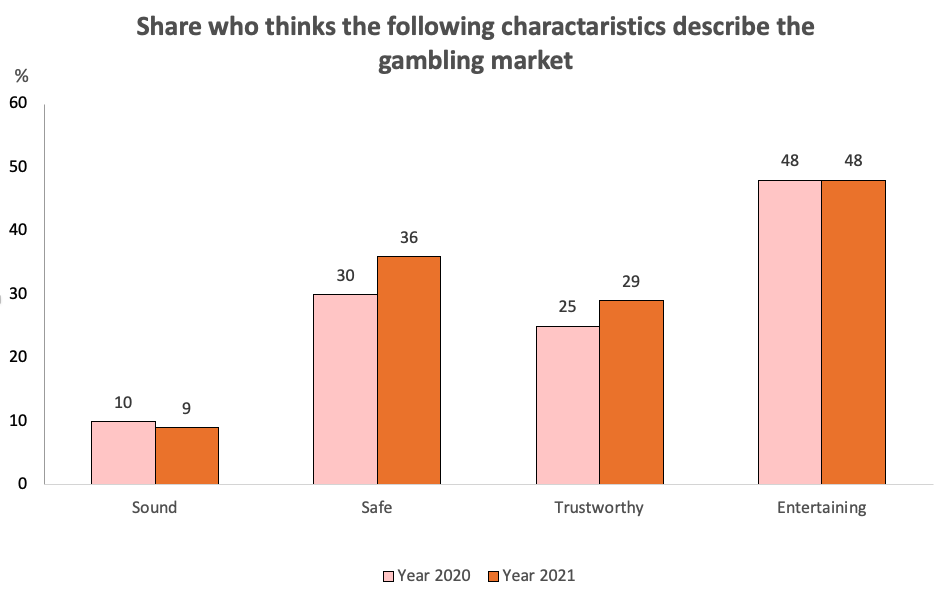
Gambling company holding a Swedish license
To see if a gambling company has a license.
Since 1 January 2019, a Swedish gambling license is required for gambling companies to offer gambling for money in Sweden.
Of those who have gambled in the last twelve months, only one in ten (10 %) answer that they know how to see if a gambling company or website has a Swedish gambling license or not.
To a greater extent than others, those who play often consider that they can see which companies and sites have a Swedish gambling license.
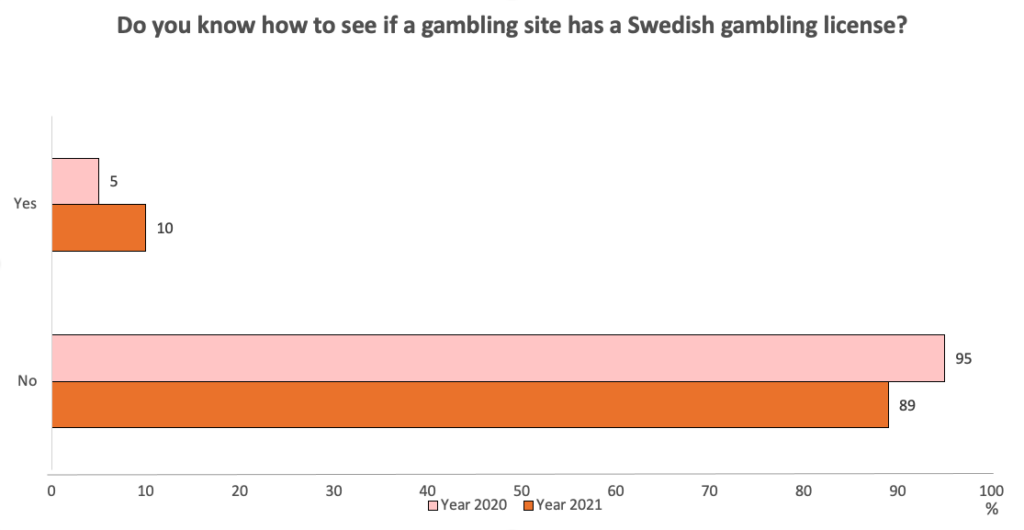
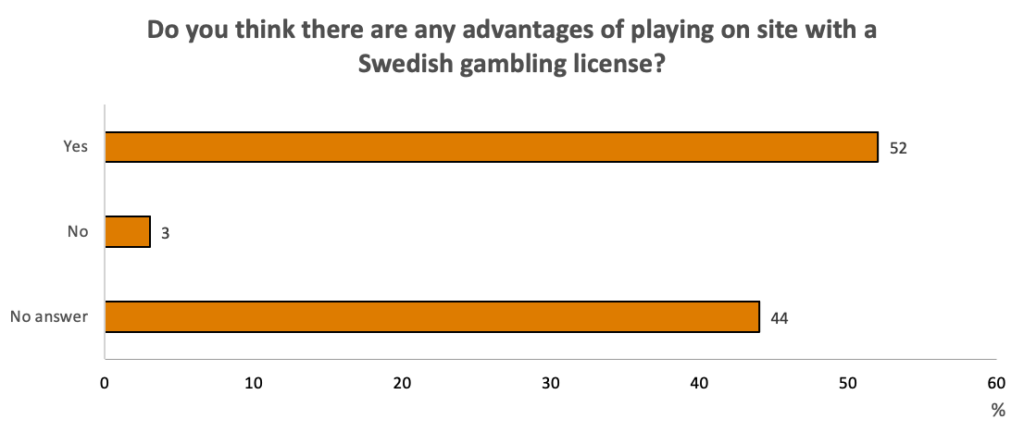
How to see if someone has a Swedish gaming license
Those who answered that they could see if a gambling company, or a website, has a Swedish gambling license were asked how they could see it.
52 % see benefits to play at licensed gaming companies
Most players 52 %) think that there are advantages, for them as players, to gamble at a gambling company with a Swedish license.
The benefits of playing with licensed companies
Those who believe that there are advantages, for them as players, to gamble at a gaming company holding a Swedish gaming license were asked what those advantages are.
To gamble on websites without a Swedish license.
20 % willing to gamble on websites without a license
Playing on gambling websites without a Swedish gambling license is legal. SKOP asked those who have played the last 12 months, “Would you consider playing on a gambling site that doesn’t have a Swedish gambling license?“
One in five players (20 %) can absolutely or perhaps imagine themselves gambling on sites without a Swedish license; 4 % answer that they absolutely can. Men can, to a greater extent than women, consider doing so.
A majority (79 %) can’t imagine themselves gambling on sites without a license.
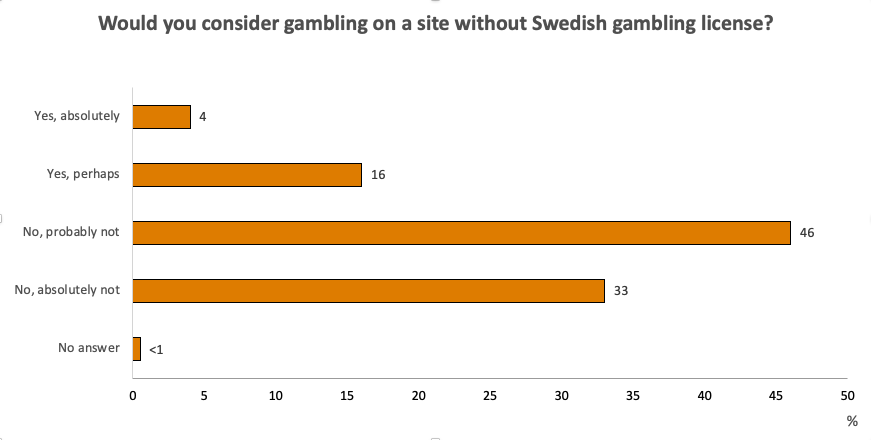
1 % have gambled on websites without a Swedish license in 2021
A few players (1 %) have intentionally gambled on sites without a Swedish gambling license in 2021.
The results must be interpreted with great caution as there are only 12 respondents who intentionally played for companies without a license in 2021.
3 % have had contact
Few of those who have played in the last 12 months have contacted customer service or other staff at any gambling company where they gambled.
The gambling industry’s social responsibility
All 1,600 interviewees were asked, “Do you think that the Swedish gambling industry takes sufficient social responsibility?“
One in three (36 %) answer yes, that the gaming industry absolutely or perhaps takes sufficient social responsibility, 5 % answer yes, absolutely.
Those who gamble often consider, to a greater extent than others, that the gambling industry takes its responsibility. Men consider it to a greater extent than women.
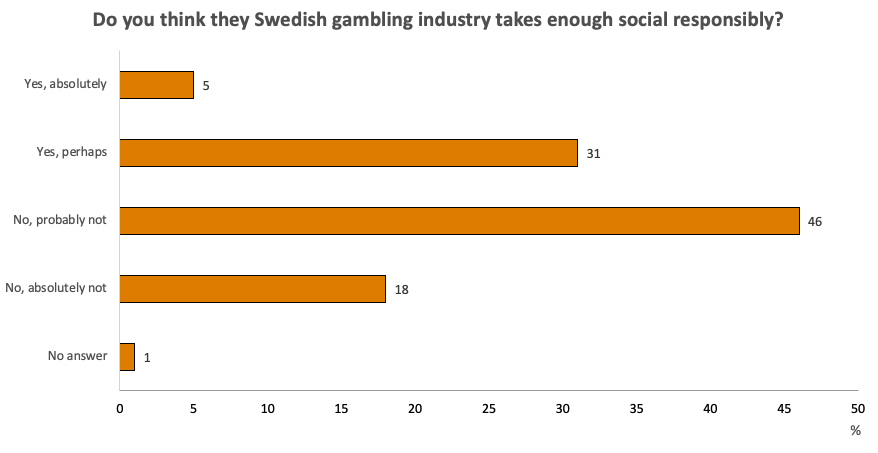
Gambling industry advertising
SKOP asked all interviewees how often they have seen or heard advertisements for gambling about money on different digital channels during the past year.
Most commonly: Seen and heard advertising on websites
A majority (53 %) have seen or heard advertisements for gambling for money daily or weekly on websites like aftonbladet.se.
Online videos were the second most common.
Slightly more than one in three Swedes (38 %) have encountered advertising in online videos every day or week on digital channels like YouTube and TV4 Play.
Social media was the third most common.
About as many (37 %) have seen gambling advertising on platforms like Facebook and Instagram on a daily or weekly basis.
Apps was fourth most common.
One in three (36 %) have encountered gambling ads via apps, such as mobile games, every day or every week.
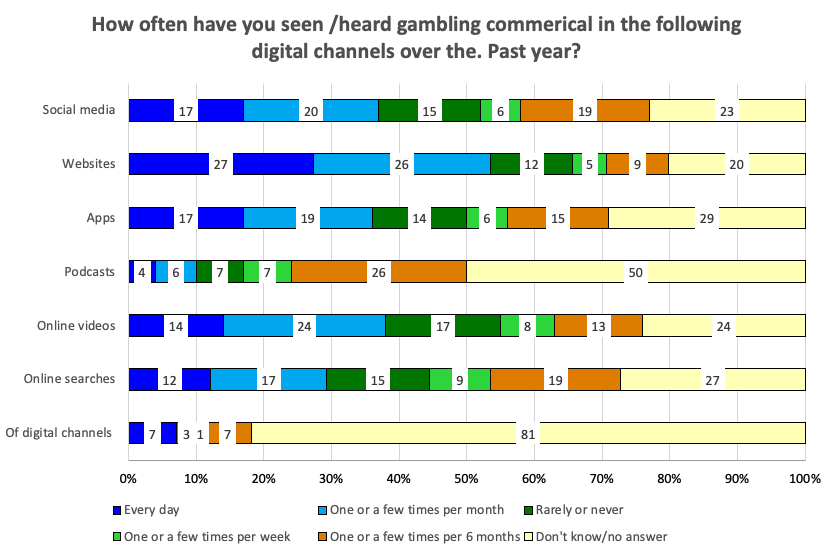
In podcast broadcasts, it’s less common to get advertisements about gambling weekly (10 %), similarly in other digital channels (10 %).
How often different groups see advertisements gambling varies between the age groups’ media habits. Some digital media are used significantly more by younger than by older people.
Gambling too much
2 % consider themselves to have played too much
Two % of the Swedes feel that they have gambled too much at some point during the last 12 months.
More (5 %) feel that someone close to them has played too much in the past year.
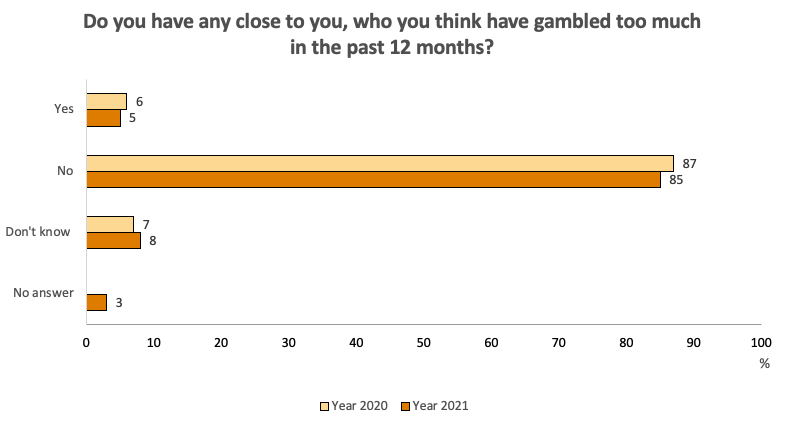
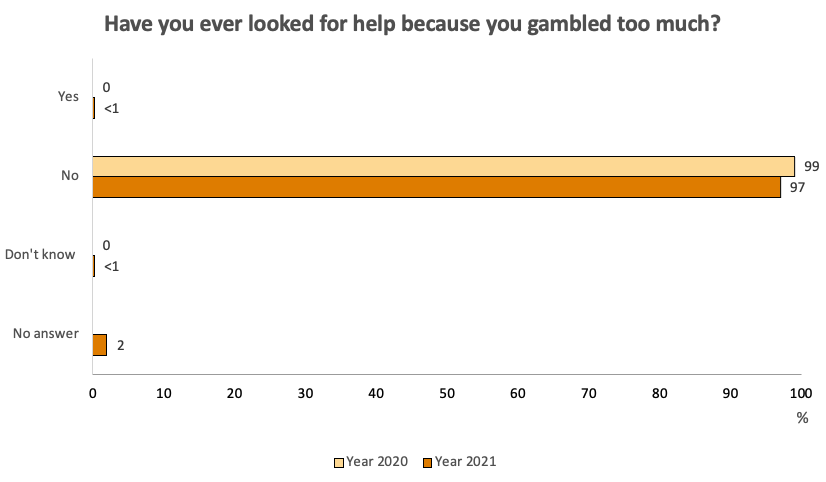
Spelpaus.se
Swedes can self-exclude from gambling sites with a Swedish gambling license.
59 % know spelpaus.se
SKOP asked, “Do you know that it is possible to self-exclude yourself from gambling via the website Spelpaus.se?”
A majority of Swedes (59 %) know about spelpaus.se, and 1 % have used the site.
The 17 players who have used spelpaus.se were asked why they did so. The small number of answers means that the percentages must be interpreted carefully.
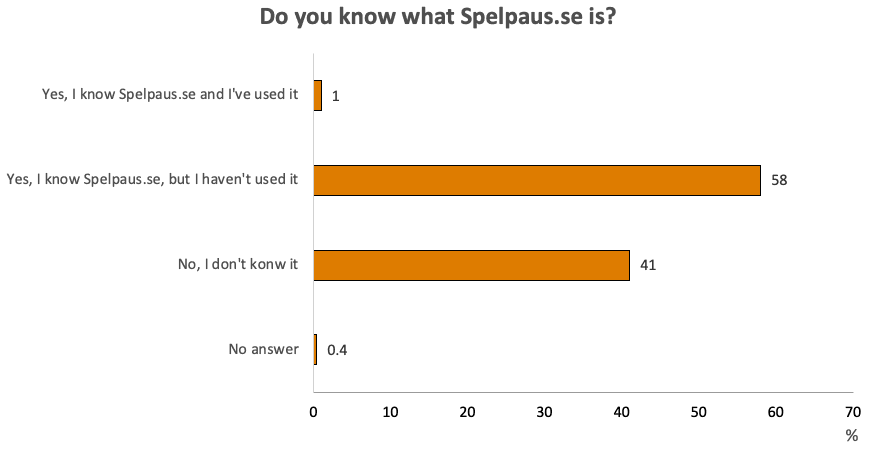
Methodology description
Questionnarie
The questions were prepared by the Swedish Gaming Authority and have been used in previous surveys carried out on behalf of the Swedish Gaming Authority. Prior to this year’s survey, the questions were updated in collaboration between the Swedish Gaming Inspectorate and SKOP. SKOP edited the web form.
Population and sample
The population consisted of people living in Sweden and 18 years or older.
SKOP’s active web panel was used as a selection. SKOP’s web panel is randomly recruited from the population register among people mainly asked postally to reach the entire population of people living in Sweden.
A random selection was made from SKOP’s active panel for the Swedish Gaming Authority’s survey.
Data collection method
The survey was conducted as an online survey.
Investigation period
The survey was conducted in November 2021.
Response rate and dropout
The sample consisted of 2,192 people in SKOP’s active web panel, and 1,578 people chose to participate. It gives a participation rate of 72%.
SKOP continuously recruits to the panel in conjunction with surveys, and such newly recruited people provided 76 responses. In total, the survey had1,654 participants.
Weighting
The answers have been weighted, and post stratified for gender, age, and nine regions. Each stratum impacts the overall result corresponding to their shares of Sweden’s population 18 years or older.
